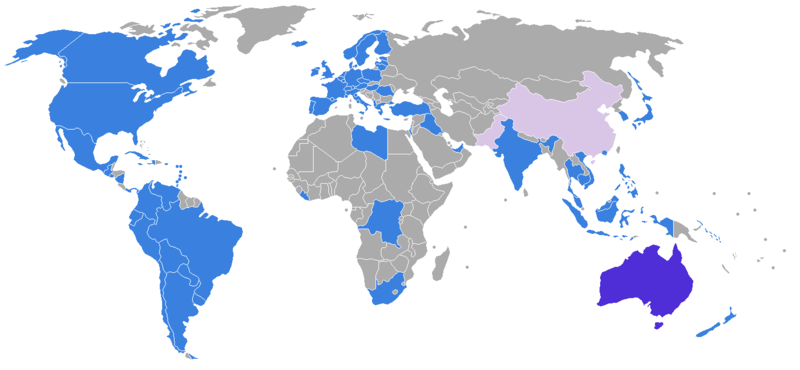Extradition law in Australia
Extradition law in Australia permits the formal process by which a fugitive found outside a jurisdiction is surrendered to the jurisdiction where an alleged offence has taken place for trial or punishment. This may include a process done within the country or one between Australia and another country.
Interstate extradition
The power to extradite between and among the states and territories of Australia is conferred by s 51(xxiv) of the Australian Constitution which says that the Commonwealth Parliament shall, subject to the Constitution, have the power to make laws for the peace, order, and good government of the Commonwealth with respect to (inter alia):
the service and execution throughout the Commonwealth of the civil and criminal process and the judgments of the courts of the States.[1]
Interstate extradition procedures are governed by the Service and Execution of Process Act 1992 (Cth), Part 5. Under the Act, a person named in an extradition warrant issued in any state may be arrested in accordance to that warrant in another state.[2] Upon apprehension, that person must be brought before a magistrate of the state in which they were apprehended along with the warrant or a copy of the warrant.[3] The local jurisdiction has priority in respect of offences in that jurisdiction so that a person charged or in prison in the jurisdiction must be processed and serve time before extradition to the other state.
Extradition to and from Australia
The Extradition Act 1988[4] governs the extradition to other countries of fugitives found in Australia. The law ratifies a series of treaties to which Australia is a party with other countries, either in the right of the Commonwealth of Australia, by being bound by treaties which the United Kingdom executed on behalf of the Commonwealth of Australia, or multilateral treaties to which Australia is a signatory.
The absence of an extradition treaty does not, in theory, prevent the arrest or extradition to or from another country e.g. through the London Scheme for Commonwealth member states, or through regulation (e.g., Cambodia).[5]
Extradition between Australia and New Zealand is governed by a separate and distinct regime, known as the 'backing of warrants' system.
Map of Countries

Countries with which Australia has extradition arrangements
According to the Attorney-General, Australia has extradition arrangements with the following countries:[5]
- Through bilateral extradition treaties:
Argentina, Austria, Belgium, Brazil, Chile, Ecuador, Finland, France, Germany, Greece, Hong Kong, Hungary, India, Indonesia, Ireland, Israel, Italy, Republic of Korea, Latvia, Luxembourg, Malaysia, Mexico, Monaco, Netherlands, Norway, Paraguay, Philippines, Poland, Portugal, South Africa, Spain, Sweden, Switzerland, Turkey, United Arab Emirates, United States, Uruguay, Venezuela, and Vietnam. - Through inherited treaties (especially for former colonies etc.):
Albania, Bolivia, Colombia, Cuba, El Salvador, Guatemala, Haiti, Iraq, Liberia, Nicaragua, Panama, Peru, Romania and San Marino. - Through backing of warrants:
New Zealand - Through the London Scheme (current and former Commonwealth of Nations member states):
Akrotiri and Dhekelia (the Sovereign base areas on the Island of Cyprus), Anguilla, Antigua and Barbuda, Bahamas, Bangladesh, Barbados, Belize, Bermuda, Botswana, British Antarctic Territory, British Indian Ocean Territory, British Virgin Islands, Brunei Darussalam, Cayman Islands, Cyprus, Dominica, Eswatini, Falkland Islands, Gambia, Ghana, Gibraltar, Grenada, Guyana, Jamaica, Kenya, Lesotho, Malawi, Maldives, Malta, Mauritius, Montserrat, Namibia, Nigeria, Pakistan, Pitcairn, Henderson, Ducie and Oeno Islands, Seychelles, Sierra Leone, Singapore, South Georgia and South Sandwich Islands, Sri Lanka, Saint Helena, St Kitts and Nevis, St Lucia, St Vincent and the Grenadines, Tanzania, Trinidad and Tobago, Turks and Caicos Islands, Uganda, Zambia and Zimbabwe - Through regulations (not treaty based):
Bosnia and Herzegovina, Cambodia, Canada, Cook Islands, Croatia, Czech Republic, Denmark, Estonia, Fiji, Iceland, Japan, Jordan, Kiribati, Kyrgyzstan, Lebanon, Lithuania, North Macedonia, Marshall Islands, Montenegro, Nauru, Papua New Guinea, Serbia, Slovakia, Slovenia, Solomon Islands, Thailand, Tonga, Tuvalu, United Kingdom, Vanuatu and Western Samoa.
See also
References
- Constitution (Cth) s 51 Legislative powers of the Parliament.
- Service and Execution of Process Act 1992 (Cth) s 82) Persons subject to warrants may be apprehended.
- Service and Execution of Process Act 1992 (Cth) s 83) Procedure after apprehension.
- Extradition Act 1988
- ALPHABETICAL COUNTRY INDEX – AUSTRALIA’S INTERNATIONAL CRIME COOPERATION RELATIONSHIPS
- Proposed extradition treaty between Australia and Pakistan. Australasian Legal Information Institute (16 March 2000). Retrieved on 3 Jan. 2012.
- China-Australia Extradition Treaty Collapses Amid Human Rights Concerns
External links
- [http://www.austlii.edu.au/au/other/dfat/ Australian Legal Information Institute –
- AUSTRALIA’S NON-TREATY EXTRADITION ARRANGEMENTS